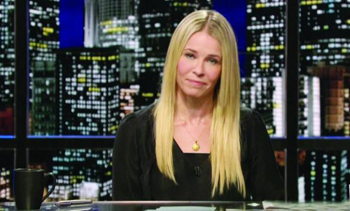
Jeddah, Jan 2: Saudi women expressed outrage at Chelsea Handler, the American host of the TV show “Chelsea Lately,” when she swore at Saudi men for being able to receive notification by SMS of their wives’ travels abroad. Some are tired of explaining the situation to foreigners and others say Chelsea should have done her homework before going on air.
The 37-year-old American talk show host asserted that “they have this new policy in Saudi Arabia where if a woman leaves the country, the husband receives a text message,” before going on to use foul language to express her disdain.
She continued: “Talk about the worst marriage ever. You have to have a conversation every time you want to leave house? I don’t think so buddy; you’re lucky if I tell you where I’m going.”
Sabah Abdulmalik, a 42-year-old stay-at-home-mom said, “I would like to inform Chelsea that this is only a service that people can activate or decline and that this was not forced upon us,” said.
“This service was developed by the Saudi authorities and not by husbands who want to track their wives, so when she says such a word, she should know that it was not conceived of at a local level and that it’s a matter of choice,” she added.
Saudi fashion designer Reem AlKanhal says she respects freedom of speech but this crossed the line. “I think we have deeper problems than traveling, driving and covering our faces. They only focus on the aspects of our lives that make them laugh and we hate to be the butt of jokes on live television,” she said.
“We have female leaders and accomplished women but the international media does not like to shed light on this, choosing instead to brainwash their audience that we still live in tents and that we don’t have rights,” she added.
A female Saudi blogger who chose to remain anonymous said that Chelsea’s clip was offensive not only to Saudi women, but to Islam as well. “We learned that Muslim women should not leave the house without the approval of their husbands and I think it’s the right thing to do,” she said.
“Her words were very aggressive and we do not accept such attacks, especially using bad words knowing that this is not how we were raised and this is not normal to us in Arab, local TV shows and talk shows,” she added.
Sarah Essam, a 32-year-old mother of two, wonders how Chelsea thought she was defending Saudi women in making these statements. “I know that using shocking language and discussing controversial topics are surefire ways to attract a larger audience, but this is beyond disrespectful and she crossed the line,” she said.
“Thanks to her words, she actually made us defend our husbands and stand behind this service even if we don’t approve of it,” she added.
Mariam Hejazi, a 28-year-old banker, demanded an apology from Chelsea. “We have been tolerating the international media for a really long time. How can they judge a whole nation when funnily enough, it is their motto to “never judge a book by its cover,” she said.
“She should have done her homework as a TV host or journalist. She should have investigated further because if she did, she would have known that we were raised knowing we do not travel or leave the house without our husbands knowing and that the text messaging system is a service that can be accepted or declined,” she added.
Yasmine Abdulrazak, an English teacher at a college in Jeddah, thinks the clip was actually funny and did not feel offended by it. “I don’t know why we are always offended when people talk about us. Yes, the media highlights the negative things about Saudi Arabia and they always make women feel like we need a hero to save us,” she said.
“Chelsea is a comedian and her job is to mock people and attack others to make her audience laugh. We see her make fun of celebrities, politicians and nations but they do not express offense in the same way we did today,” she added.





Comments
Add new comment